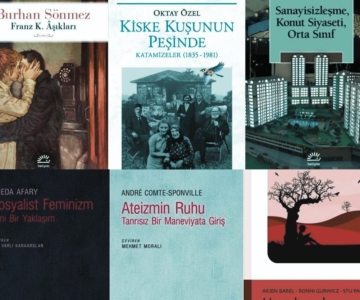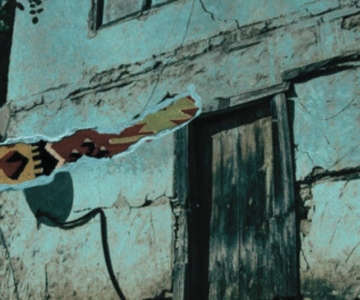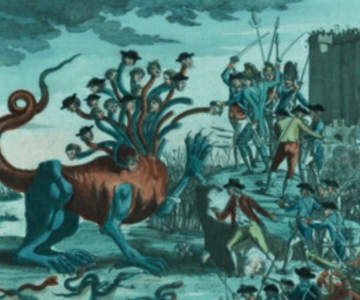Tatlı Perşembe (Sweet Thursday)
John Steinbeck, Ayşegül Çetin (Translator)
World Literature, 283 Pages
Nobel Prize winner John Steinbeck’s book published by İletişim Yayınları, Tatlı Perşembe, the last part of the Monterey Trilogy, draws a sincere and cheerful portrait of a society trying to emerge from the shadow of war with the familiar faces of Cannery Row. This novel, woven with new friendships, old habits and small happinesses, reminds us once again of the belief in humanity and the power of goodness.
Tatlı Perşembe is Nobel Prize winner John Steinbeck’s softest and most cheerful novel…
When Doc, the unforgettable character of Cannery Row, returns to his neighborhood after World War II, he sees that everything has changed. Fortunately, Mack and his friends are still there with all their eccentricities and sincerity. The new residents of the neighborhood, Fauna, who has taken over the brothel, and Suzy, who has just arrived at the house, enter Doc’s life in a way he never expected.
In the final book of his Monterey Trilogy, Sweet Thursday, Steinbeck tells the story of good people and instills hope in humanity in the post-war era.
“A post-war sequel to Cannery Row, [Sweet Thursday] is as delicious and relaxed as the original… It is a comedy; bawdy, emotional and funny.”
THE ATLANTIC
“A clear and concise expression of Steinbeck’s greatest theme: those common bonds of humanity and love that make goodness and happiness possible…”
NEW REPUBLIC
___
Tepsideki Melek (Angel on a Tray)
Esra Kahya
Turkish Literature, 215 Pages
Tepsideki Melek, written by Esra Kahya and published by İletişim Yayınları, is a narrative that seeks traces of the past in today’s homes, in lace, slippers and the whisper of silent objects. This novel, which travels through the folds of family memory, delicately handles the invisible legacies that women leave to each other, the deep well of childhood, and the strange, sometimes sad but always beautiful aspects of love.
Tepsideki Melek is one of the household. She is left by her great-grandmother, what? The old angel is older than all of us. She came from distant lands. She does not know what fatigue is, she can do everything with her wings. She offers tea, sorts rice, serves coffee, and sits in the corner of the kitchen, leaning on the tap pipe. She watches us all from there.
A little girl who learns the language of things wanders around the house. She listens to the sounds coming from her mother’s slippers, the walnut display case in the corner, the lace covers, the armchairs, the carpets, the walls… Esra Kahya tells about women from generation to generation, what mothers take from their daughters, how the well called childhood draws people in, that love is a beautiful thing, and the periods and cities behind the scenes. The Angel in the Tray is a family history novel woven with subtleties. Like a crazy cry that makes you laugh nonstop.
___
Vaker
Evren Yesari
Turkish Literature, 182 Pages
Evren Yesari’s novel Vaker, published by İletişim Yayınları, invites the reader to Buharkapı Neighborhood with the colorful, sad and persistent voice of Suriçi Istanbul. Vaker is the novel of Gypsies and urban transformation…
After what I have told, some may ask where I have been until now. I have many reasons; I will definitely mention them in the following entries. For now, let me say this much: First, I had to believe in myself, prove to myself what I experienced. I wanted to tell myself first whether what I experienced, what I witnessed and what I saw were real or not.
Buharkapı Neighborhood is full of stories. Sometimes with lies, sometimes with exaggeration, every story is fermented and passed from mouth to mouth… The children, young people and old people of this neighborhood both cry and belly dance. They like to speak their own language: Sovaker lasçuke vakas uskusmu avaryu itallano mokkoviç half bread sandwich…
Evren Yesari creates an original narrative that intertwines literature and social media. While taking us, the readers, through the pages of a novel, he also takes us through the images of a medium like YouTube.
Vaker is a novel of Suriçi Istanbul, Gypsies and urban transformation.
___
Erken Cumhuriyet’ten Günümüze (From the Early Republic to the Present)
Türkiye’de Ulaştırmanın Siyaseti (The Politics of Transportation in Türkiye)
Ahmet Cemal Ertürk
Today’s Books, 287 Pages
Ahmet Cemal Ertürk’s work titled Türkiye’de Ulaştırmanın Siyaseti, published by İletişim Publications, deeply examines how transportation policies have been intertwined with developmentalist ideologies, neoliberal transformations and political interests from the early years of the Republic to the present. This comprehensive analysis, which extends from railways to mega projects, is a powerful reference source for those who want to understand the alliances and conflicts established by the state, capital and politics over roads.
“Developmentalism combined with neoliberalism can now impose the most brutal and merciless form of capitalism on societies. Development is inevitable, but it takes its rightful form only if it can be used to extract rent, create growth and feed capital.”
The complex relationship between transportation and politics in Türkiye has a deep history extending from the foundation of the Republic to the present. “Türkiye’de Ulaştırmanın Siyaseti: Erken Cumhuriyet’ten Günümüze” examines the historical and economic-political dimensions of this multi-layered relationship. While addressing the development of Türkiye’s transportation infrastructure in a wide range from railways to highways, seaways to airways, the book also reveals the decisions and priorities of political powers and the social effects of politics in this process. The transformation of the ideology of developmentalism with its reflections in different periods, the impact of the wild liberal policies of the Özal years, the neoliberalism of the AKP era and the rise of “mega projects” that recognize no boundaries, provides a critical framework for understanding Türkiye’s evolution in the field of transportation.
Focusing on the relationship between politics, the state and capital, Ahmet Cemal Ertürk’s work is a comprehensive resource examining the economic and social dynamics caused by the political practices in the transportation sector of the Republic of Turkey…
___
Düzen ve Kalkınma Kıskacında Türkiye (Turkey in the Grip of Order and Development)
Kalkınma Sürecinde Devletin Rolü (The Role of the State in the Development Process)
Ahmet İnsel, Ayşegül Sönmezay (Translator)
Research-Analysis, 271 Pages
Ahmet İnsel’s work titled Düzen ve Kalkınma Kıskacında Türkiye, published by İletişim Yayınları, examines the contradictory role of the state in late capitalist Türkiye, both establishing and trying to keep the economic sphere under control, from a historical perspective. Extending from the Ottoman Empire to the Republic, this analysis questions Turkey’s political-economic mind on the axis of statism, development and social organization, while deeply examining the fragile balance between order and change.
In societies where capitalism developed late, why does the political power try to establish and institutionalize the economic sphere on the one hand, and why and how does it remain constantly on the alert against these developments on the other? Düzen ve Kalkınma Kıskacında Türkiye examines the political-economic mind that shaped the history of Türkiye until the 1960s and the understanding of state/statism envisioned by this mind by focusing on these questions. Ahmet İnsel first evaluates the Ottoman state order and the role of social organization and economy within this vision of order. Then, he analyzes the points where the new “state” that was established in place of the classical state order with the Republic began to contradict the definition and need for development and social change in line with economic trends. At the center of this analysis are state enterprises and efforts to “create a working class dependent on the state.” These efforts, on the other hand, create a new political picture in which the state goes beyond economic statism and strengthens its central role vis-à-vis society in the face of the dilemma of order and development.
Düzen ve Kalkınma Kıskacında Türkiye focuses on a historical perspective in which the state is always at the center, the economic sphere is framed according to this political perspective, and social demands or conflicts are not given meaning outside the central role of the state: Without neglecting how the concepts of state and economy have been repeatedly constructed both historically and politically…
___
Selçuklular (Seljuks)
Siyaset, Toplum, Kültür (Politics, Society, Culture)
Christian Lange (Editor), Songül Mecit (Editor), Özkan Akpınar (Translator)
History, 429 Pages
Selçuklular – Siyaset, Toplum, Kültür, compiled by Christian Lange and Songül Mecit, is published by İletişim Publications. The work examines the Seljuk world, which extended from Central Asia to Anatolia, not only with its political power, but also with its social organization, cultural production and urbanization process. Prepared with the contributions of leading figures in the field, this study evaluates the permanent effects of the Seljuks on Islamic history from a new perspective and offers an in-depth resource for Seljuk studies.
Selçuklular – Siyaset, Toplum, Kültür In addition to the ideological foundations of an empire that expanded from Central Asia to Anatolia, it focuses on the representations of Seljuk power, the relations between nomads and settled people, the legal understanding of the period, and how caravan routes and libraries shaped society. While narrating the powerful transformation of the Seljuks, it does not neglect their social history, and also sheds light on the urbanization process, literary and architectural development. This study, compiled by Christian Lange and Songül Mecit and contributed by A.C.S. Peacock, C. Edmund Bosworth, Carole Hillenbrand, D.G. Tor, Daphna Ephrat, David Durand-Guédy, Jürgen Paul, Massimo Campanini, Robert Hillenbrand, Scott Redford, Vahid Behmardi and Vanessa Van Renterghem, adds a new dimension to Seljuk studies.
“The long-term consequences of the Seljuk rise to power, their formative influence on later socio-political orders, and how they were perceived within these orders have received little attention from researchers. […] The Seljuks also laid the foundations for political, social, and cultural organizational structures that continued to exist after them. Thus […] they served as switchmen who irreversibly changed the course of Islamic history. This book aims to contribute to the growing interest in this extremely important dynasty.”




